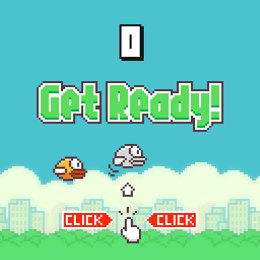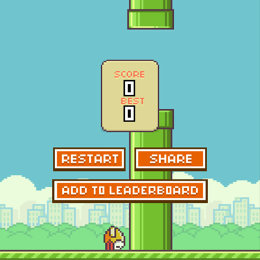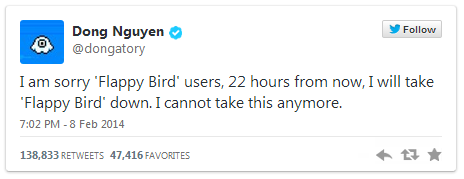When Vietnamese developer Dong Nguyen launched Flappy Bird, and then abruptly pulled it from online marketplaces, he created quite a stir among game aficionados. The addictive little game created a high-priced aftermarket that many brands never achieve. Even after garnering $50,000 a day, Flappy Bird still proved valuable postmortem.
Addiction played a great deal into the success of the game, and it was perhaps even the reason Nguyen took the game down.
But marketers, brand managers, product developers, and other executives can take away a few lessons from Flappy Bird’s success. Here are five addictions that will drive more people to your business:
1. ADDICTION TO SIMPLICITY
Flappy Bird was no Call of Duty, Halo, or Grand Theft Auto. It wasn’t even Angry Birds–but it was understandable and accessible.
To be engaging, products and services don’t need to be complex, photo-realistic journeys or lavish customer experiences. Many memes stimulate complex behaviors from simple ideas, as complexity theory points to small actions or simple chemicals that create complex behaviors or multicellular life.
If a product, a service, or an internal process isn’t achieving its goals, examine it through the lens of simplicity and strip out superfluous elements that expose the most important, and therefore most likely to engage, elements.
2. ADDICTION TO EARLY WINS
Flappy Bird didn’t require its audience to master a complex set of controls, understand weapons, or memorize complex environments–and because of that, the little adrenaline jolt of winning was triggered early and often.
Products that make people wait for the payoff may lose customers due to lack of patience. Apple designs the box experience separate from the device user experience because opening the box is the first win that any product offers its owner. As a manager, if you want people to collaborate better, innovate, or be more excited about their work, reward them, not with annual perks, but with fast feedback and other recognition that is genuine and timely.
3. ADDICTION TO SERENDIPITY
Place the specifications for Flappy Bird on Kickstarter and it might find funding, it might not. Reading the game play sounds pretty close to something like 1980s Defender. But sometimes what’s on paper doesn’t matter. What people do with what ends up in the market does, and that often involves a confluence of unpredictable events.
For Flappy Bird, some inherent need in the market for something simple from an unknown developer that downloaded fast and offered rapid gratification–among dozens of other attributes–led to the product being a runaway hit. Serendipity can happen quickly, or it can take time, but if you ever gauge action through the lens of efficiency and predictability, you will likely fail to let things develop that rely on nuance, uncertainty, and happenstance.
4. ADDICTION TO PREPARING FOR SUCCESS
Dong Nguyen was naïve, and that paralyzed his ability to deal with Flappy Bird’s success. Part of that success was becoming big enough to become a target of naysayers. Big organizations should never use unanticipated success as an excuse for ultimate failure, and small organizations, even individuals, can learn from Nguyen.
Be prepared to engage with customers, use all feedback in a constructive way even if it isn’t constructive, and think about what’s next as soon as you ship the current version. Also consider how you protect your intellectual property just in case you create something that other people want to imitate. And if you aren’t prepared for success, then you shouldn’t be putting products or services out that the public may love or hate. Even big companies fail when they develop something that offers a promise they can’t fulfill.
5. ADDICTION TO DIFFERENTIATION
The success of Flappy Bird may have been serendipitous, but once an implemented version hit the market, its features were easily copied and the experience it produced mimicked. Copying may have occurred eventually, but Nguyen’s rapid removal of the game from Google Play and the Apples App Store eliminated the perception of its shame in copying.
The next game for developers was the game to create the best clone. Race on. For most businesses, whether they offer simple product engagement models or complex experiences, they need to continuously think about how to differentiate themselves from other experience, lest they become a commodity.
In the first instance, the simplicity of Flappy Bird was its differentiation from overproduced and complex games that often come with brand baggage and story overload. Simplicity in complex markets, quality of execution in saturated markets, human relationships replacing automation in low-cost markets, and delivering on brand promises are all easy (or not so easy) ways for organizations to differentiate themselves without reintroducing complexity.
[Image: Flickr user ashraful kadir]




